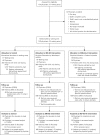Pairing physician education with patient activation to improve shared decisions in prostate cancer screening: a cluster randomized controlled trial
- PMID: 23835818
- PMCID: PMC3704492
- DOI: 10.1370/afm.1550
Pairing physician education with patient activation to improve shared decisions in prostate cancer screening: a cluster randomized controlled trial
Abstract
Background: Most expert groups recommend shared decision making for prostate cancer screening. Most primary care physicians, however, routinely order a prostate-specific antigen (PSA) test with little or no discussion about whether they believe the potential benefits justify the risk of harm. We sought to assess whether educating primary care physicians and activating their patients to ask about prostate cancer screening had a synergistic effect on shared decision making, rates and types of discussions about prostate cancer screening, and the physician's final recommendations.
Methods: Our study was a cluster randomized controlled trial among primary care physicians and their patients, comparing usual education (control), with physician education alone (MD-Ed), and with physician education and patient activation (MD-Ed+A). Participants included 120 physicians in 5 group practices, and 712 male patients aged 50 to 75 years. The interventions comprised a Web-based educational program for all intervention physicians and MD-Ed+A patients compared with usual education (brochures from the Centers for Disease Control and Prevention). The primary outcome measure was patients' reported postvisit shared decision making regarding prostate cancer screening; secondary measures included unannounced standardized patients' reported shared decision making and the physician's recommendation for prostate cancer screening.
Results: Patients' ratings of shared decision making were moderate and did not differ between groups. MD-Ed+A patients reported that physicians had higher prostate cancer screening discussion rates (MD-Ed+A = 65%, MD-Ed = 41%, control=38%; P <.01). Standardized patients reported that physicians seeing MD-Ed+A patients were more neutral during prostate cancer screening recommendations (MD-Ed+A=50%, MD-Ed=33%, control=15%; P <.05). Of the male patients, 80% had had previous PSA tests.
Conclusions: Although activating physicians and patients did not lead to significant changes in all aspects of physician attitudes and behaviors that we studied, interventions that involved physicians did have a large effect on their attitudes toward screening and in the discussions they had with patients, including their being more likely than control physicians to engage in prostate cancer screening discussions and more likely to be neutral in their final recommendations.
Keywords: decision making; doctor-patient communication; medical uncertainty; patient activation; patient-centered care; patient-physician relationship; prostate; randomized controlled trial; shared; standardized patient.
Figures
References
-
- Schröder FH, Hugosson J, Roobol MJ, et al. ERSPC Investigators Screening and prostate-cancer mortality in a randomized European study. N Engl J Med. 2009;360(13):1320–1328 - PubMed
-
- Briss P, Rimer B, Reilley B, et al. Task Force on Community Preventive Services Promoting informed decisions about cancer screening in communities and healthcare systems. Am J Prev Med. 2004; 26(1):67–80 - PubMed
-
- Makoul G, Clayman ML. An integrative model of shared decision making in medical encounters. Patient Educ Couns. 2006;60(3): 301–312 - PubMed
-
- Bieber C, Nicolai J, Hartmann M, et al. Training physicians in shared decision-making-who can be reached and what is achieved? Patient Educ Couns. 2009;77(1):48–54 - PubMed
Publication types
MeSH terms
Grants and funding
LinkOut - more resources
Full Text Sources
Other Literature Sources
Medical
Research Materials
Miscellaneous


